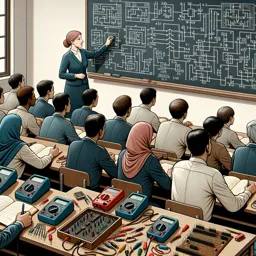Introduction
As you advance in your journey toward becoming a skilled electrician, moving beyond basic theory and foundational wiring is essential. Intermediate electronics bridges the gap between theory and practical proficiency, providing hands-on knowledge required in the real world. This article explores the essential topics, tools, and applications you’ll encounter as you master intermediate-level electronics.
Key Concepts in Intermediate Electronics
At this level, you’ll expand your understanding of active and passive components, circuit analysis, and troubleshooting techniques. Vital concepts include:
- Semiconductors: Learn how diodes, transistors, and integrated circuits function and how they’re used in modern devices.
- Amplifiers and Oscillators: Analyze and design circuits that control signal strength and frequency, crucial for communication and control systems.
- Filters and Signal Conditioning: Discover how to manipulate signals with filters, sensors, and conditioning circuits for various applications.
- Schematic Reading: Improve your skills in interpreting complex circuit diagrams and translating them into functioning hardware.
Essential Tools for Hands-On Learning
Working on intermediate projects introduces new tools and testing equipment. Key additions to your toolbox include:
- Oscilloscopes for signal visualization
- Function generators to simulate input signals
- Digital multimeters with advanced functions
- Prototyping boards for testing circuit designs
Proficiency with these tools enables you to diagnose and correct issues quickly, making you a more efficient and competent electrician.
Applying Intermediate Electronics in Real-World Scenarios
Understanding how theory applies to practical challenges is the hallmark of an intermediate learner. Examples include:
- Designing and assembling power supplies for devices and machinery
- Troubleshooting and repairing circuit boards in common appliances
- Interfacing sensors and actuators in automation projects
- Upgrading or modifying existing electronic installations
These applications reinforce the vital connection between classroom knowledge and real-world problem-solving.
Tips for Success in Intermediate Electronics
- Keep a detailed project and troubleshooting log to record solutions and discoveries.
- Collaborate with peers to share knowledge and solve complex issues together.
- Participate in online forums and workshops to stay current with industry trends.
With perseverance and the right guidance, your expertise will open doors to advanced electronics and supervisory roles in the field.
Conclusion
Intermediate electronics is a critical stepping stone for professionals seeking to elevate their skills. By focusing on practical applications, expanding your toolbox, and continuously learning, you’ll gain the confidence and competence needed for success as an electrician.































